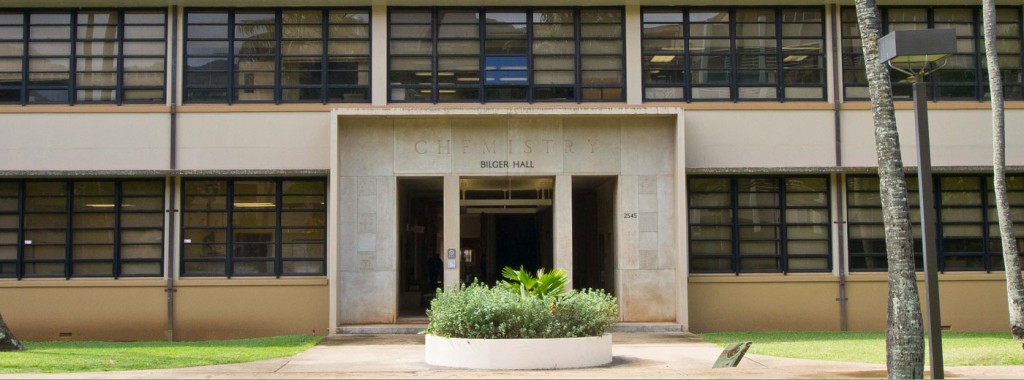
Overview: In line with the University’s commitment to undergraduate and graduate studies, the Department of Chemistry at the University of Hawaii at Manoa has recently begun to expand its facilities. The department currently has 12 permanent (tenured and tenure-track) faculty members, 5 adjunct professors, 2 non-tenure track faculty, 2 instructors, 21 postdoctoral research fellows, and 6 technical and secretarial staff members. The graduate program has approximately 45 students, of which half are in the Ph.D. program with the remainder working towards their M.S. degree. Typically, there are 240 undergraduates pursuing a B.A. or B.S. in Chemistry and Biochemistry at the University of Hawaii at Manoa.
Faculty Interests: The faculty of the Department of Chemistry have research interests in bioinorganic, organic, inorganic, and physical chemistry. The main areas of research in the Organic Chemistry division are bioorganic and natural products chemistry. Particular emphasis is found in two areas, the isolation and identification of antitumor compounds derived from terrestrial and marine organisms and the total synthesis of anticancer agents. The Inorganic Chemistry division focuses on the syntheses and characterization of new materials, such as those for hydrogen storage and catalysis. Physical Chemistry at UH Manoa includes experimental and theoretical approaches, such as NMR spectroscopy of proteins, reaction dynamics in astrochemistry, combustion chemistry, planetary chemistry and computational studies of the interactions between surfaces and small molecules.
Interdisciplinary Research: The graduate faculty participate in a number of collaborative efforts. Organic chemistry faculty interested in natural products chemistry are part of an integrated drug discovery program with colleagues at the University of Hawaii Cancer Center . Faculty are involved in other intra- and interdepartmental research programs, such as the hydrogen program of the Hawaii Natural Energy Institute (HNEI), the Cell and Molecular Biology Program, the W.M. Keck Astrochemistry Laboratory, and the Shanghai-Hawaii-Hefei Advanced Research Center for Astrochemistry.
Faculty members maintain research programs and participate in the graduate education program. Most of the faculty also teach undergraduate courses and direct undergraduate research projects. Individual faculty web pages give more details of the research programs underway. Extramural support for faculty research comes from several federal agencies, including the National Institutes of Health, the National Science Foundation, the Department of the Army, the Department of Energy, NASA, Keck Foundation, and Air Force Office of Scientific Research. Additional support comes from industrial sources and private foundations.
Facilities: The Department has a strong commitment to maintaining state-of-the-art instrumentation. Our instrumentation includes three NMR spectrometers equipped for a wide-range of nuclei: a Varian Mercury Plus 300 for routine solution NMR (Upgraded in 2014) and an Agilent 600 MHz for advanced multidimensional and/or multinuclear experiments. MS equipment includes a QQQ and a QTOF. See our facilities page for more details. Departmental staff provide training for graduate and post-doctoral students.
A short walk from Bilger Hall is Hamilton Library. This library houses a large collection of books and subscribes to all major chemical and biochemical periodicals. Members of the Chemistry Department enjoy extensive access, and computerized literature searching is available, using databases such as Chemical Abstracts, Science Citation Index, and Engineering Index.
